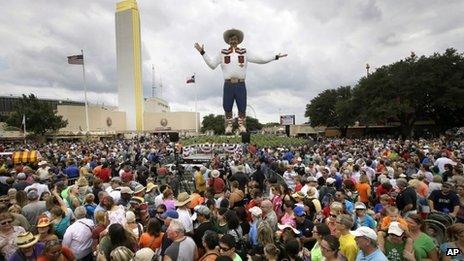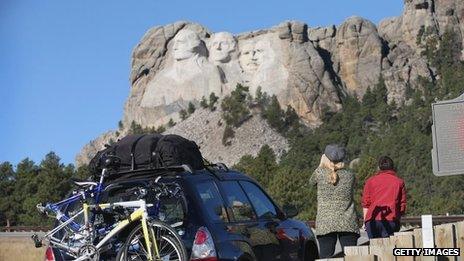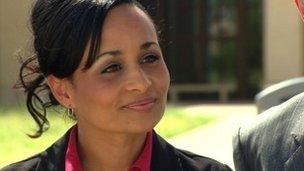Mardell: Support for shutdown in Texas
- Published

Big Tex, 55 foot of pure cowboy, looms over the Texas State Fair. The mechanical mannequin is new, replacing old Tex, who burnt down last year.
Everything, as we know, is bigger in Texas. The state is proud of its bristly independence, fierce, in-your-face, refusing to go along with the herd.
People wander around munching on foot-long corn dogs - hot dogs deep-fried in batter. You can get deep-fried Thanksgiving dinner, deep-fried margaritas, even deep-fried butter.
Some of the opinions are pretty hardcore too, not what you hear in Washington DC.
A man in a black Stetson tells me of the shutdown: "I think it's good. The Republicans need to stand up to what's going on in this country and stop the Democrats spending money like it's going out of style.
"There needs to be a showdown and it's a good first step in the right direction."
His wife chips in: "It's not good to happen this way but when is it good to have a showdown? We are headed towards socialism and that's not America."
Another man says: "I don't want Obamacare, so I think it is a good thing that they're shutting down. Obama wants to force his way on everybody and he needs to respect the Republican party."
A few people blame both sides, and just want them to sort it out, but there is little support for the president.
'Frightening' uncertainty
It is this sort of view back home that give some Republicans the backbone to embark on a course that others regard as reckless.
It makes them scared that they will lose their seats, even though they don't seem to have much of strategy beyond hanging tough.
But Texas also has one of the largest federal workforces in the country - after only the DC area and California.
Billy Gollema, an aviation safety inspector, is devastated to find he is not deemed an essential worker.
"It's quite frightening not knowing whether you have a job or when you get to come back to work. We haven't been told how long this will take."
He's not sure who to blame. "They need to get the government back to work and work out their differences."

Some of the US's best known monuments have been closed by the shutdown
It is not just offices that are shut. So are the national parks. I arrive at one of the smaller ones, Hickory Creek, just hours before the campers all have to leave.
One of the last of them sits astride his motorcycle in front of a mobile home. He'd planned on a two-week holiday but has to move on.
He says he does not trust himself to speak about President Obama, but it is pretty clear who he blames for the shutdown.
I find Rhonda Gilles at home - she and her husband live here in a neat and roomy RV, in return for helping out around the park.
Talk radio blares out its conservative message as she lays the table for dinner. It's going to be shrimp and steak - they are celebrating because after a worrying few days they have learnt they are being allowed to stay.
But she thinks it's sad and they will miss sharing a beer with their usual friends this weekend.
Mrs Gilles tells me: "Our president needs to get in there and negotiate, roll up his sleeves and work like everybody else."
So is it his fault? "I've never seen a president act like this. I am a little embarrassed for him."
Tea Party pressure
My fairly random encounters with people who share the Tea Party's line are telling, and important. It may reflect the echo chamber effect of talk radio and Fox news.
It may be simply that the Tea Party does represent a strong current of opinion.

Katrina Pierson is one of the Tea Party activists putting pressure on the Republican leadership
The George W Bush Presidential library is another victim of the shutdown, and it is where I meet Tea Party leader Katrina Pierson, external. Hers is a name to watch. The popular image of the movement is one of old white guys. She's young, black, and a single mother.
She is planning to stand against a Republican leader in Congress, Pete Sessions, external, who in her view has not been hostile enough to Obamacare.
It is exactly the sort of thing that has Republicans looking over their shoulders and moving to the right.
It is why Mr Obama has accused Republicans in Congress of doing the bidding of extremists in their own party.
But Katrina Pierson is unapologetic.
"This is a representative republic,... and what we saw in the last elections is that Republicans were overwhelmingly elected in the Congress, which is the voice of the people.
"So this shutdown is just an indicator of where the people America stand on this issue. The people have decided they don't want Obamacare. The fight you are seeing is the fight the people wanted."
Authority on the line
I ask Ms Pierson if the politicians in Congress were frightened of the Tea Party's power.
"They're absolutely frightened. That's why you're seeing a lot of flip-flopping in the last six months.
"They should be [frightened] because... we are organised, we communicate and the people have spoken."
What about the debt ceiling, and all the warnings that the Republicans can't play games with the world's future?
"These congressmen, these senators, are making a choice and they are going suffer the consequences if they don't listen to their constituency.
"We should not be raising the debt ceiling, we are spending way too much money as it is, and that is what the Tea Party stands for."
President Obama has repeatedly said there will be no negotiating over Obamacare. He can hardly blink now.
If he does, it would shred his authority. But it is not only his reputation that is on the line.
In Texas, and I am sure in many parts of the South and the Midwest, there are many voters who are delighted that their politicians are sticking their heels in.
If the showdown turns into a climb down they will pay a huge price.